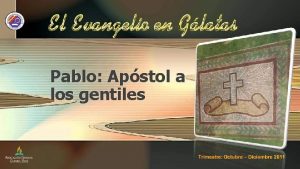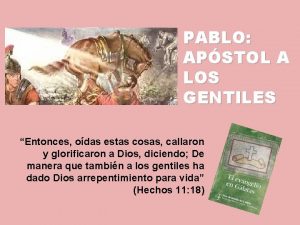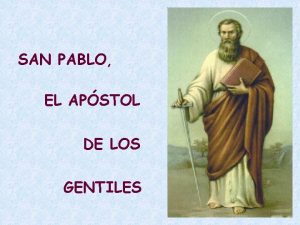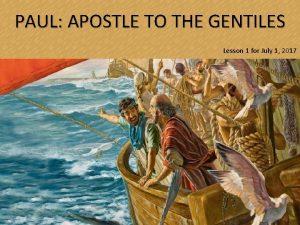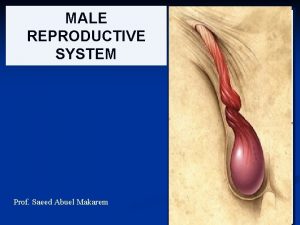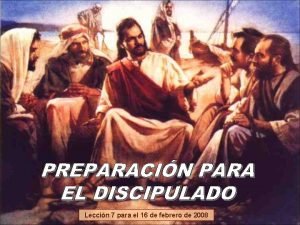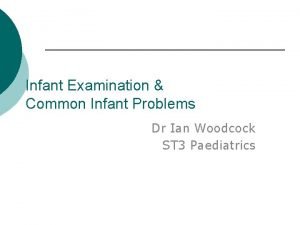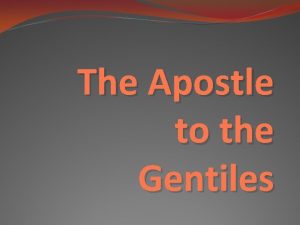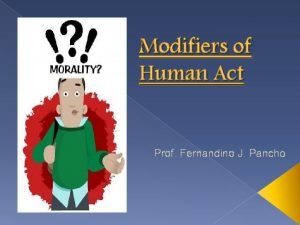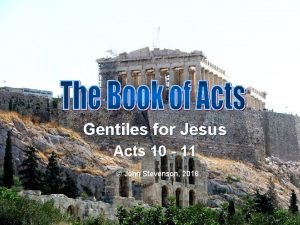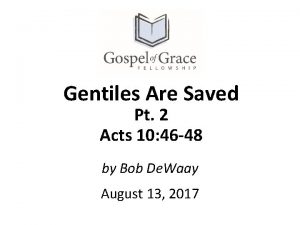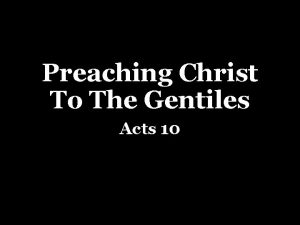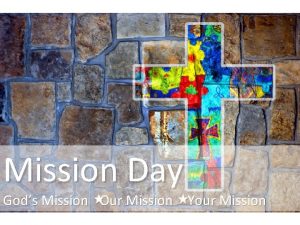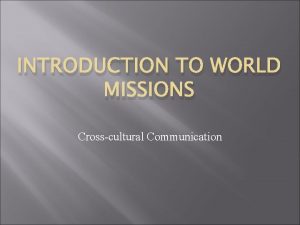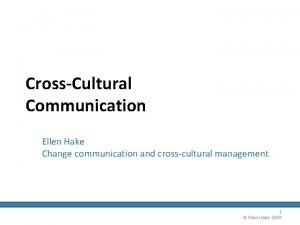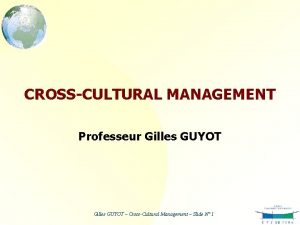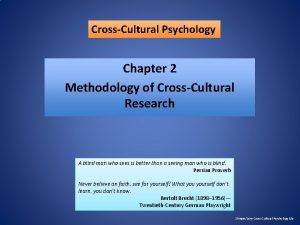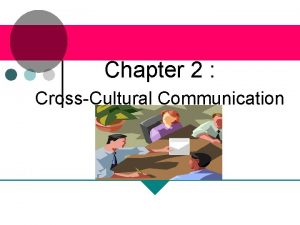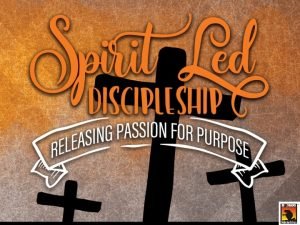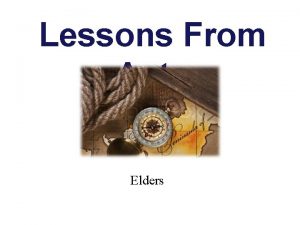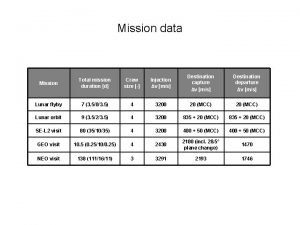Mission to the Gentiles Acts 13 15 CrossCultural



























- Slides: 27

Mission to the Gentiles Acts 13 -15

Cross-Cultural Mission to the Gentiles Acts 11: 19 -26 sets the stage for Acts 13 beginning of missions to the Gentile world Barnabus & Paul were sent to reach the Gentiles from the Church in Antioch Church – made up of Jewish believers who met in house churches In the next slides we will see Key Developments Paul has to address in reaching the Gentile World

Colossian Church The City of Colosse A rich cosmopolitan city located in Asia Minor on the main east/west trade route - known for wool & dye manufacturing. A religious center/hotbed for religious heresies/speculations. A large number of Jews lived there. The Church at Colosse. Both Jews/Gentiles in Asia Minor heard Paul’s Gospel (Acts 19: 10). Epaphras & Philemon heard & went back to Colosse (Acts 19: 10; 20: 31) to start the church (Col. 1: 6 -7; 4: 12). A strange heresy threatened the church so Epaphras went to Rome to see Paul (while imprisoned) for advice. This provoked Paul to write his 1 st. Prison epistle (60 -62 AD), refuting this heresy & affirming Christ’s supremacy (Col. 1: 8)

Thessalonian Church 1 Thessalonians Who wrote this letter? Paul wrote 1 Thessalonians (1: 1) about AD 50 or 51 (Acts 18: 5) from Corinth. 2 Thessalonians followed right after, making 1 & 2 Thessalonians the earliest letters from Paul. Whom did he write to? To the church in Thessalonica – named after Alexander the Great’s half-sister, founded about 315 BC by Cassander of Macedonia, a provincal capital. The church was largely Gentile w/ some Jews

Thessalonian Church 1 Thessalonians Why did he write it? Paul wrote after receiving a report from Timothy about the church (3: 6 -7) – writes w/ joy in their holding on to faith despite Paul & his co-laborers departure & harassment they suffered from hostile factions Some of the Jewish community stirred up animosity against the believers which resulted in a riot. Many believers were arrested & Paul, Silas, & Timothy were smuggled outside the city What did Paul address? The soon coming judgment that God had placed in the hands of Christ in the last day (4: 6) The affirmation of Christ’s divinity

Thessalonian Church 2 Thessalonians The author of this letter is Paul (1: 1: 3: 17) It was written right after 1 Thessalonians about AD 51 from Corinth Similarities w/ 1 Thessalonians: teaches the imminent return of Christ – stresses the suddenness & unexpectedness in which the Day of The Lord will overtake those who aren’t prepared 2 Thessalonians: teaches that certain events must occur before Christ’s return – counteracts the new misunderstanding in the Thessalonian church that the Day of The Lord had already arrived

Thessalonian Church 2 Thessalonians Characteristics: Written to supplement what was written in 1 Thessalonians & correct a premature announcement of the Day of The Lord. This church was undergoing persecution which they understood to be end-time disturbances. Another motif for writing was to deal w/ chronic idleness of some members caused by the misconception that the Day of The Lord might happen so sudden that working for a livelihood was a denial of faith.

Colossian Church (cont. ) The Crisis at Colosse. The problem: “The Colossian Heresy. ” Acts 2: 8 The clues: “Philosophy” (Col. 2: 8), Rituals (2: 11, 16), Asceticism (2: 20 – 21), Lawlessness (3: 5), Angel worship (2: 18), Christian ideas (2: 3) The results: “Syncretism” a blending together (Jewish – circumcision, Pagan – system of the world, Christian – looked like Christianity) - a mixture of thoughts/ideas different from Paul’s gospel. They gave Jesus “a” place but not “the” place.

Colossian Church (cont. ) The correspondence. 1 st of the Prison Epistles. Colossians & Ephesians are similar especially at the end of the letters (70 references to each other) both w/ different purposes. Ephesians is an expanded Colossians. In Colossians Paul goes holy ballistic. In Ephesians Paul is more calm & spiritual. The conclusion: “IGnosticism” or “Knowledge” in its early stages (1 st & 2 nd Cent. ) prevailed in Ancient Asia Minor & Near East - salvation achieved t/ special ‘Gnosis’ of a transcended being or “emanations” (pure/perfect who had nothing to do w/ the material evil universe). They considered Jesus as one of the divine emanations who descended from the spirit realms a divine redeemer. They denied His incarnation - considered Jesus as a good teacher who showed the ways of salvation. They didn’t give Jesus the place as the Son of God/Son of Man who took on flesh to die & rise again for man’s salvation.

Galatian Church The Church: This church was founded on Paul’s 1 st. Missionary journey about AD 49 from Antioch. Paul visited several cities in Galatia of his missionary journeys – Antioch, Pisidia, Iconium, Lystra, Derbe, & Ephesus This letter is a circular letter – not addressed to specific group of believers but to several churches in the southern Providence of Galatia. The unsettling news from the new churches in Galatia Province provoked Paul to write – the Galatians were beginning to turn from faith to legalism

Galatian Church Its Purpose: The Christian Jews of Antioch held to Jewish traditions/Law & would not allow Gentiles into their synagogues & homes. They were compelling Gentile converts to observe Jewish Laws & traditions, particularly the Laws of Moses, in addition to believing in Christ Paul argues that if the doctrine of justification by faith is undermined, it could seal off the Christian movement as a mere Jewish cult limited forever to tiny segment of the world population. This book is a call to faith and freedom in Christ. Paul explains that the Law can’t save anyone. Galatians is our charter to Christian freedom (Gal. 5: 1)

Galatian Church (cont. ) Key Features: The most pressing controversy of the early church was the relationship of new Gentile believers to Jewish Laws. The Law included those Laws found in the OT: Ceremonial Laws – has to do w/ Israel’s worship. Civil Law – dictated Israel’s daily living. Moral Laws – required to be carried out in strict obedience Paul argues that not all types of Laws apply to those who have experienced Christ. Marks of a false Gospel include: Treats Christ’s death as meaningless. Compels people to obey the Law in order to be saved. Finds favor w/ God by observing rituals. The keeping of the Law erases sins

Galatian Church (cont. ) From the beginning of the early church, forces have been at work to destroy, distort, & derail the movement of the Gospel. Here are 3 that attacked the Galatian Church: Judaizers: held that Christians are Jews who recognized Jesus as their promised Savior and that any Gentile desiring to be a Christian must first be a Jew. This group adds traditions/laws to God’s laws & removes God’s acceptances of all nations Legalizers: held that Christians lived by “do’s” & “dont’s” & that God’s favor is earned. This view reduces Christianity to an impossible standard of acceptance & moves God’s love, mercy, & grace toward humanity Lawless: advocates that Christians live above the law & nullifies God’s Word as our rule& standard for living. This view removes people’s humanity that falls short all the time & fails when guided by feelings & emotions

Galatian Church Paul’s defense against these groups: Authenticity of the Gospel (Gal. 1: 1 - 2: 21) – the source of the Gospel is God Superiority of the Gospel – the Law shows people where they have sinned & the gravity thereof and points them to Christ Freedom of the Gospel – the death of Jesus Christ has given believers forgiveness of sins, the gift of eternal life – making us free from the grip of sin & death, - and have been empowered by the Holy Spirit to live a life pleasing to God

Corinthian Church 1 Corinthians The Reason It has been widely accepted that Paul is the author of this book. He founded this church on his 2 nd. Missionary journey (Acts 18: 1 -11) & wrote from Ephesus (AD 53 -57) during Paul’s 3 rd. missionary journey (1 Cor. 16: 8) Corinth was one of the largest & corrupt cities in the Roman empire. It was a strategic commercial center that provided international pleasures Paul arrived in Corinth after a bad experience in Athens (Acts 17: 16 -34) – the foolishness of worldly wisdom from Greek philosophers made him determined to: Preach the simple message of the cross, no matter how offensive it may seem to some (1 Cor. 2: 1 -5) To focus his ministry on Gentiles – the Corinthian church of both Jews & Gentiles grew tremendously

Corinthian Church 1 Corinthians The Report A serious report came from Chloe’s household about division, abuse of the sacraments, disorder during worship, theological problems, & extreme laxity & unhealthy ascethism. Some believers insisted in that association w/ unbelievers was permissible & necessary while other held that isolation was important to preserve holiness – opposing views endangered the future of the church Other serious reports from the church included: criticism about Paul, immorality, lawsuits among believers, matters about marriage & divorce, foods offered to idols, spiritual gifts, financial giving, & a request of a visit from Apollos

Corinthian Church 1 Corinthians The Response His ministry in Corinth lasted more than 18 month (Acts 18: 11, 18) – he had reason to expect more spiritual maturity from this church. In addressing the bad reports, Paul also treats the following deep & recurring problems: Challenges to Paul’s apostleship, pride issues, a lack of love among the brethren Paul also focuses his teaching on God’s sovereignty, the nature of the church, sanctification, and the bodily resurrection

Corinthian Church 2 Corinthians Paul wrote this intensely personal letter – give details of his whereabouts & associations The letter is dated around AD 55 – written after he left Ephesus but before he arrived again in Corinth (Acts 20: 2) Sometime later after receiving bad news while in Ephesus, Paul once again heard of rising difficulties in the church & immediately set sail back to Corinth. The visit brought Paul sorrows (2 Cor. 2: 1). He responded by sending a strong letter w/ Titus rebuking them & encouraging them to repent. Upon Titus’ return, Paul was filled w/ joy as he heard of the church’s repentance & loyalty to Paul.

Corinthian Church 2 Corinthians He then wrote 2 Corinthians from Macedonia to express thanksgiving for the repentance & renewed obedience of the church (2 Cor. 7: 5 -16) He encouraged them to complete their collection for the poor in Jerusalem (2 Cor. 7 & 8) He defends his apostleship & ministry against accusations Upon his return to Corinth, Paul stayed for 3 months and then departed for Jerusalem w/ the collection for the poor (Acts 20: 3 -21)

Roman Church About this Letter: Paul wrote this epistle to this well-established church (Rom. 15: 22 -24) made up of mostly Jews, Proselytes (not full pledged Jews but attended the Synagogues & followed the teachings of Judaism) & Gentile Christians. The church in Rome was made up of a coalition of home fellowships This letter addresses specific issues & to a particular group of people – Jews/Gentiles & slaves/free. It’s not designed to be explicit in theology & doctrine – addresses real issue to real people. This letter cannot be read in segments but must be approached in its entirety Upon heading out on his 3 rd. Missionary journey, Paul wrote from Corinth to prepare the Romans for his arrival

Roman Church Occasion for the Letter: Jews had started the church but the Roman Emperor Claudius kicked Jews from Rome in AD 54 over a squabble over “Chrestos” or Christ Upon their return 6 years later they found that the church had become Gentile in culture (Rom. 3 & 11). Jews (who had pioneered the church) wanted things as before but the Gentile leadership didn’t accept this idea. Jews felt they were God’s special focus & wanted the Gentiles to back off. Paul exposed the tension between both groups (Rom. 14). “Strong” vs “weak, ” “circumcision” vs “uncircumcision” these issues over whether or not believers need to obey certain provisions of the Law gave way to division in the Church. Jews rejected the ways of the Gentiles

Roman Church Paul deals w/ Gentile & Jewish Issues: He corrects the Jews about their preoccupation with the Jewish Law and its place in the life of Christians (Rom. 7) Paul rebukes the Gentile Christians for their arrogance (Rom. 11: 18 -25) He proposes unity b/t Jews & Gentiles in the Church Paul’s Stance: To define & defend the Gospel of Christ The importance of unifying the Roman Church around a common vision of the Gospel

Ephesian Church An important City. Key city to Asia Minor (present day Turkey) w/ a huge harbor; 4 major highways that ran t/ Ephesus. Called the “Market Place of Asia” because all commercial, political, & religious activities revolved around Ephesus. The center of worship of Artemis (Roman sex god) & was considered the 7 th wonder of the ancient world. This temple contained the largest bank in Asia - market charms or idols. An important Church. Paul started this church on his 2 nd. Missionary journey - left Aquilla and Pricilla to lead the church. On the 3 rd missionary journey he spent 3 yrs there (Acts 20: 31). Acts 19 shows what it was like in Ephesus. Magic books were known as the Ephesians’ book. This church is the backdrop for: Ephesians, the Gospel of John, 1 -3 John, Revelation, 1 -2 Timothy.

Ephesian Church (cont. ) An important Character. Ephesians is canonically before Colossians because of the profoundness of content. “Though Ephesians is not the longest of Paul’s epistles, it is generally conceded to be the most profound. ” J. Sidlow Baxter. Ephesians has been called: The Alps of the NT, Grand Canyon of Scripture Fort Knox of the Bible, The believers’ bank. An important Correspondence. Paul wrote this letter around 60 -62 AD from Roman imprisonment (a rented apartment/house & under house arrest). It was written to the church at Ephesus & surrounding churches – a Circular letter (Eph. 1: 2). The main theme is Christ as the Head of the church (Eph. 1: 22).

Ephesian Church (cont. ) An important construction. Of all of Paul’s letters Ephesians is the most orderly. 3 Fold construct of Ephesians: ¶ 1 -3 ¶ 4 -5 ¶ 6 Sit! (2: 6 -7) Walk! (4: 1) Stand! (6: 13) Our doctrine Our duty Our defense Our Position Our Practice Our Protection Our Riches Our Responsibility Our Residence Our Calling Our Conduct Our Conflict Our Wealth Our Walk Our Warfare

Philippian Church A special city: It was a strategic city in Europe located on the main highway from Asia to Rome - a mining community & military city. It was here the first church in Europe started. It was a Roman colony - Gentiles of Italian & Greek culture (no synagogues or OT influence) & the people had “Roman Rights” - a replica of Rome (food, dress), spoke Latin and were free from Imperial taxes. Luke pastored in Philippi & worked at the medical center. A special church Paul started church this on his 2 nd missionary journey about 50 -52 AD. Acts 16 Paul visited the church twice on the 3 rd missionary journey (53 -57 AD). Acts 20 Paul wrote Philippians wrote during his Roman imprisonment (60 -62 AD).

Philippian Church (cont. ) Special purpose: Paul had a close loving relationship w/ them. They sent financial gifts 3 X – 2 X at Thessalonica & once at Corinth - even though they were poor. 2 Corinthians 8: 1 -2 Their 4 th. financial gift was sent by Epaphroditus - possibly their pastor. Philippians was a thank you note – “never forgot me, ” “partnered w/ me, ” “gave toward me. ” Special characteristics: Joy – “joy” 4 X; “rejoice” 8 X; “glad” 3 X. Phil. 1: 18; 4: 4 Unity - Phil. 1: 27; 2: 2; 4: 2 God - In the 104 verses of Philippians there are 51 references to God.
 Ministerio de pablo a los gentiles
Ministerio de pablo a los gentiles Apstol
Apstol San pablo el apostol de los gentiles
San pablo el apostol de los gentiles Paul the apostle to the gentiles
Paul the apostle to the gentiles Circumcided dick
Circumcided dick Circumcision
Circumcision Por caminos de gentiles no vayais
Por caminos de gentiles no vayais Sacral dimple
Sacral dimple Apostle to the gentiles
Apostle to the gentiles Mateo 10:5-7
Mateo 10:5-7 How do modifiers affect our human actions
How do modifiers affect our human actions đại từ thay thế
đại từ thay thế Vẽ hình chiếu vuông góc của vật thể sau
Vẽ hình chiếu vuông góc của vật thể sau Quá trình desamine hóa có thể tạo ra
Quá trình desamine hóa có thể tạo ra Công thức tiính động năng
Công thức tiính động năng Thế nào là mạng điện lắp đặt kiểu nổi
Thế nào là mạng điện lắp đặt kiểu nổi Lời thề hippocrates
Lời thề hippocrates Dot
Dot Bổ thể
Bổ thể Vẽ hình chiếu đứng bằng cạnh của vật thể
Vẽ hình chiếu đứng bằng cạnh của vật thể Phản ứng thế ankan
Phản ứng thế ankan Môn thể thao bắt đầu bằng chữ f
Môn thể thao bắt đầu bằng chữ f Khi nào hổ mẹ dạy hổ con săn mồi
Khi nào hổ mẹ dạy hổ con săn mồi điện thế nghỉ
điện thế nghỉ Một số thể thơ truyền thống
Một số thể thơ truyền thống Thế nào là sự mỏi cơ
Thế nào là sự mỏi cơ Trời xanh đây là của chúng ta thể thơ
Trời xanh đây là của chúng ta thể thơ Gấu đi như thế nào
Gấu đi như thế nào
